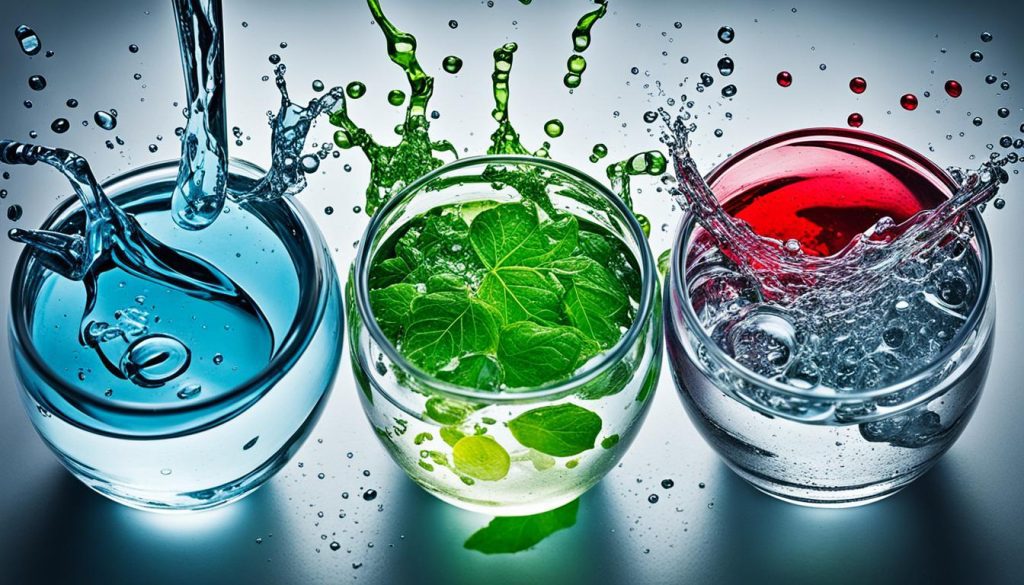Water retention, also known as edema, can have various causes. It occurs when there is an abnormal accumulation of fluid in the body tissues, leading to swelling. Understanding the underlying reasons for water retention is essential for finding effective solutions. Let’s explore the primary causes of water retention and discover practical ways to address this issue.
Water Retention Causes
- Water retention, or edema, is the abnormal accumulation of fluid in body tissues, causing swelling.
- Identifying the specific cause of water retention is crucial in developing an effective treatment plan.
- Common causes of water retention include excessive fluid intake, a high sodium diet, hormonal imbalances, certain medications, and underlying health conditions.
- Making lifestyle changes, such as maintaining a balanced diet, limiting sodium intake, and engaging in regular physical activity, can help reduce water retention.
- In some cases, medical intervention, such as diuretic medications, may be necessary to treat water retention.
Common Causes of Water Retention
There are several factors that can contribute to water retention. Identifying the specific cause of water retention is crucial in order to develop an effective treatment plan.
- Excessive Fluid Intake: Consuming large amounts of fluids, especially those high in sodium, can lead to excessive water retention.
- High Sodium Diet: A diet rich in sodium can cause the body to retain water, as sodium contributes to fluid buildup.
- Hormonal Imbalances: Hormonal changes, such as those experienced during the menstrual cycle or pregnancy, can lead to fluid retention.
- Certain Medications: Some medications, including certain antidepressants, nonsteroidal anti-inflammatory drugs (NSAIDs), and blood pressure medications, can cause fluid retention as a side effect.
- Lifestyle Factors: Prolonged periods of sitting or standing can hinder blood circulation and contribute to water retention.
- Underlying Health Conditions: Conditions such as heart failure, kidney disease, and liver disease can disrupt the body’s fluid balance and result in edema.
By understanding these common causes of water retention, individuals can take steps to address the underlying factors and find relief from excessive fluid buildup. It is essential to consult with a healthcare professional to determine the specific cause and develop an appropriate treatment plan.

Lifestyle Changes to Reduce Water Retention
Making certain lifestyle changes can help alleviate water retention. By incorporating these changes into your daily routine, you can minimize fluid buildup in your body and promote overall well-being.
Dietary Adjustments
One of the key factors causing water retention is high sodium intake. To reduce fluid retention, it is important to maintain a balanced diet and limit your sodium consumption. Consider following a low-salt diet and focusing on consuming foods rich in potassium and magnesium, which have diuretic properties. These include bananas, leafy greens, avocados, and nuts.
Ensure you are also getting adequate vitamin B6 in your diet, as it plays a role in regulating fluid balance. Foods like fish, poultry, potatoes, and non-citrus fruits are good sources of vitamin B6.
Incorporating protein-rich foods into your meals can also help reduce water retention. Lean meats, eggs, legumes, and dairy products are all excellent sources of protein that can aid in fluid balance.
Physical Activity and Elevation
Engaging in regular physical activity can have a positive impact on water retention. Exercise helps improve circulation and lymphatic drainage, reducing fluid buildup in the body. Incorporate activities such as walking, swimming, cycling, or yoga into your routine.
Elevating your feet can also be beneficial in reducing water retention. Raise your legs above heart level for 15-20 minutes several times a day, especially if you have been sitting or standing for extended periods.
Compression Wear
Wearing compression socks or leggings can aid in reducing fluid retention. These garments provide gentle pressure on the legs, promoting circulation and preventing the accumulation of fluid. Consult with a healthcare professional to determine the appropriate compression level for your specific needs.

By implementing these lifestyle changes, you can effectively reduce water retention and improve your overall well-being. Remember to consult with a healthcare professional for personalized advice, especially if you have underlying health conditions or concerns.
Medical Treatments for Water Retention
In some cases, when dealing with water retention, medical intervention may be necessary to effectively treat the condition. If you’re experiencing persistent water retention, it is important to consult with a healthcare professional for proper diagnosis and treatment options.
Depending on the underlying cause of your water retention, your healthcare provider may prescribe diuretic medications. Diuretics work by increasing urine production, which helps to remove excess fluid from the body. These medications are commonly used to treat water retention caused by various factors, including medication-induced water retention.
It’s important to note that while diuretics can be effective in reducing water retention, they should only be used under the guidance and supervision of a medical professional. Over-the-counter diuretics may seem like a quick solution, but they can have side effects and may disrupt the body’s electrolyte balance. Consulting with a doctor ensures that the appropriate diuretic treatment is prescribed, taking into consideration your unique health circumstances and any potential risks or contraindications.
Overall, medical treatments such as diuretics can play a crucial role in managing water retention. However, it’s essential to discuss your symptoms and concerns with a healthcare professional to determine the most appropriate treatment plan for your specific situation.
Serious Health Conditions Associated with Water Retention
Persistent water retention can sometimes be a symptom of a more serious health condition. Conditions such as deep vein thrombosis (DVT), heart failure, liver disease, kidney disease, and certain types of cancer can all lead to excessive fluid buildup in the body. It is important to be aware of these potential complications and seek medical attention if water retention persists or is accompanied by other concerning symptoms.
In some cases, water retention may be an indication of deep vein thrombosis, a condition characterized by the formation of blood clots in deep veins, commonly in the legs. These clots can obstruct blood flow, leading to swelling and fluid retention in the affected area.
Heart failure, a condition where the heart is unable to pump blood efficiently, can also contribute to water retention. When the heart is weakened, blood flow slows down, causing fluid to accumulate in the tissues, resulting in edema or swelling.
Liver disease, such as cirrhosis, can impair the liver’s ability to filter toxins and produce proteins that regulate fluid balance. This dysfunction can lead to excessive fluid buildup in the body.
Kidney disease, particularly in advanced stages, can disrupt the kidneys’ ability to properly eliminate waste products and regulate fluid balance. As a result, fluid retention can occur, leading to swelling and edema.
Additionally, certain types of cancer, such as ovarian, breast, or lymphatic cancer, can cause water retention as a consequence of tumor growth or the body’s response to cancer treatments.
It is important to pay attention to persistent water retention and consult a healthcare professional if it persists or is accompanied by other concerning symptoms. Proper diagnosis and treatment of the underlying health condition are essential for managing fluid buildup and promoting overall well-being.
Conclusion
Understanding the underlying causes of water retention is crucial for effectively addressing this common issue. By making necessary lifestyle changes and seeking medical intervention when needed, individuals can alleviate excessive fluid retention and improve their overall well-being.
Water retention can stem from various factors, including excessive fluid intake, a high sodium diet, hormonal imbalances, certain medications, lifestyle choices, and underlying health conditions. Identifying the specific triggers for water retention is essential in developing a targeted treatment plan.
For those experiencing occasional water retention, making lifestyle changes such as following a balanced diet, reducing sodium intake, increasing consumption of potassium- and magnesium-rich foods, and engaging in regular physical activity can help reduce fluid buildup. However, if water retention persists or is accompanied by serious health conditions, it is important to consult with a healthcare professional for proper diagnosis and appropriate treatment options.
By taking proactive steps to address water retention causes and implementing recommended solutions, individuals can effectively manage excessive fluid retention, improve their overall health, and regain a sense of well-being.
FAQ
What are the common causes of water retention?
The common causes of water retention include excessive fluid intake, a high sodium diet, hormonal imbalances, certain medications, lifestyle factors such as prolonged sitting or standing, and underlying health conditions like heart failure or kidney disease.
How can I reduce water retention through lifestyle changes?
To reduce water retention, you can maintain a balanced diet with limited sodium intake, follow a low-salt diet, increase consumption of potassium- and magnesium-rich foods, ensure adequate vitamin B6 intake, include protein in your meals, elevate your feet, wear compression socks or leggings, and engage in regular physical activity.
Are there medical treatments available for water retention?
Depending on the underlying cause, a healthcare professional may prescribe diuretic medications to help remove excess fluid from the body through increased urination.
What are the serious health conditions associated with water retention?
Water retention can sometimes be a symptom of serious health conditions such as deep vein thrombosis (DVT), heart failure, liver disease, kidney disease, and certain types of cancer.




